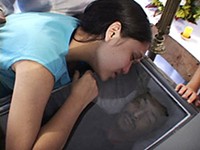King Creole
The seedy tragimusical King Creole counts as a turning point for both its legendary star, Elvis Presley, and its director, Michael Curtiz, the man who made a little film nearly two decades prior called Casablanca.
Reviewed by Eli Kooris, Fri., July 12, 2002
KING CREOLE (1958)
D: Michael Curtiz; with Elvis Presley, Carolyn Jones, Walter Matthau, Dolores Hart, Dean Jagger. King Creole marked serious career turns for both its legendary star and its legendary director. Elvis Presley -- already hip-swinging his way into rock & roll lore by the late Fifties -- begged the Army to postpone his draft call-up so that he could finish his role as the young delinquent Danny Fisher, a high school flunky roaming the mean streets of New Orleans who may have the best voice this side of the Mississippi. His singing is at least good enough to sell out the King Creole club every night, and soon young Danny is a local star, attracting good, moral five-and-dime girls like Nellie (Hart) and troubled, violated women like Ronnie (Jones, who acts a shade more lively here than she did as Morticia in The Addams Family). With Ronnie, comes her boss/pimp Maxie Fields (Matthau, superb as usual), who tries to convince Danny to sing at his club with varying degrees of intensity -- first gently, then forcefully, and finally violently. The situation quickly spins out of control, and this is where King Creole shows both its depth and range as a film. It's a romance and a musical and a crime drama all rolled into one, a grittier wrong-side-of-the-tracks Rebel Without a Cause marked indelibly with the feel of film noir. King Creole was, without a doubt, the pinnacle of Presley's acting career; it's well-documented that after his service in the Army, the King's troubled personal life led to his downward spiral and ultimately to his porcelain resting place. Meanwhile, director Michael Curtiz was already on the downhill side of his own career, its zenith marked by a little film he made nearly two decades prior called Casablanca. King Creole was a final artistic gasp for Curtiz, and he gave it his all, most notably through the monochrome look of the film that perfectly evoked the seediness of the story's elements -- love, music, and especially the streets of New Orleans.










